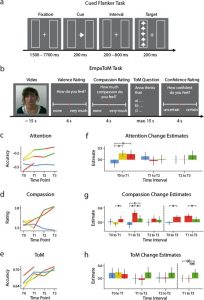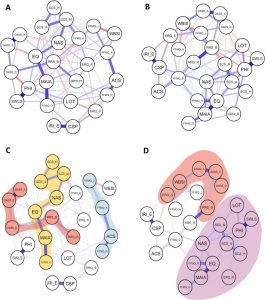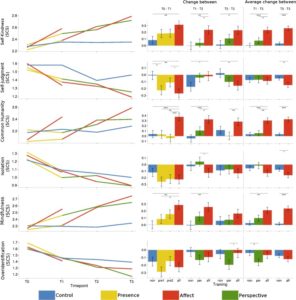Different Meditation Types Produce Different Effects on Attention, Compassion, and Theory of Mind
By John M. de Castro, Ph.D.
“The mental procedures used by various traditions and schools of meditation are fairly dissimilar. And recent scientific research has verified that these different ways of meditating activate different areas in our brain.” – Trancendental Meditation
Meditation training has been shown to improve health and well-being. It has also been found to be effective for a large array of medical and psychiatric conditions, either stand-alone or in combination with more traditional therapies. As a result, meditation training has been called the third wave of therapies. One problem with understanding meditation effects is that there are, a wide variety of meditation techniques and it is not known which work best for affecting different psychological areas.
There are a number of different types of meditation. Classically they’ve been characterized on a continuum with the degree and type of attentional focus. In focused attention meditation, the individual practices paying attention to a single meditation object. In open monitoring meditation, the individual opens up awareness to everything that’s being experienced including thoughts regardless of its origin. In Loving Kindness Meditation the individual systematically pictures different individuals from self, to close friends, to enemies and wishes them happiness, well-being, safety, peace, and ease of well-being.
In today’s Research News article “Differential benefits of mental training types for attention, compassion, and theory of mind.” (See summary below or view the full text of the study at: https://www.ncbi.nlm.nih.gov/pmc/articles/PMC6891878/), Trautwein and colleagues recruited healthy adults and assigned them to one of three conditions; presence, affect, and perspective training. Each condition consisted of a 3-day retreat followed by once a week 2-hour training session for 13 weeks along with daily home practice. The presence training focused on attention to the present moment and contained focused breath meditation, walking meditation, and body scan practices. The affect training focused on developing an “accepting, kind, and compassionate stance towards oneself and others” and contained loving kindness meditation, forgiveness meditation, and affect dyad practices. The perspective training focused on the central role that thoughts play in our lives and contained meditation of observing thoughts coming and going and perspective dyads. They were measured before and after training with a cued flanker task measuring executive control and attentional reorienting and a Theory of Mind and Social Cognition task measuring social cognitive and affective functions including compassion. Theory of mind refers to the ability to observe self-awareness in self and others.
They found that in comparison to baseline and the other modules, the presence training significantly improved executive control and attentional reorienting. They also found that the affect and perspective training produced significant improvements in the socio-emotional dimension of compassion. Finally, they found that perspective training produced significantly higher scores on Theory of Mind (understanding beliefs, desires, and needs of others). Hence the three different forms of mindfulness training affected different abilities.
The findings suggest that training on present moment awareness affects attentional abilities but not socio-emotional and theory of mind abilities. On the other hand, affect training affects socio-emotional abilities including compassion but not attention or theory of mind abilities. Finally, the results suggest that perspective training affects socio-emotional and theory of mind abilities but not attentional abilities. These findings suggest that different mindfulness training programs should be employed to target specific problem areas for the participant. They also suggest that incorporating components from presence, affect, and perspective training may produce a training package that enhances abilities in all domains.
So, different meditation types produce different effects on attention, compassion, and theory of mind.
“Meditation is a simple strategy that can help obtain better health and a happier life. It takes time to master, as does any other skill. If a person sticks with it and is willing to experiment with the different methods, they are more likely to discover a meditation style that suits them.” – Zawn Villines
CMCS – Center for Mindfulness and Contemplative Studies
This and other Contemplative Studies posts are also available on Google+ https://plus.google.com/106784388191201299496/posts and on Twitter @MindfulResearch
Study Summary
Trautwein, F. M., Kanske, P., Böckler, A., & Singer, T. (2020). Differential benefits of mental training types for attention, compassion, and theory of mind. Cognition, 194, 104039. https://doi.org/10.1016/j.cognition.2019.104039
Abstract
Mindfulness- and, more generally, meditation-based interventions increasingly gain popularity, effectively promoting cognitive, affective, and social capacities. It is unclear, however, if different types of practice have the same or specific effects on mental functioning. Here we tested three consecutive three-month training modules aimed at cultivating either attention, socio-affective qualities (such as compassion), or socio-cognitive skills (such as theory of mind), in three training cohorts and a retest control cohort (N = 332). While attentional performance improved most consistently after attention training, compassion increased most after socio-affective training and theory of mind partially improved after socio-cognitive training. These results show that specific mental training practices are needed to induce plasticity in different domains of mental functioning, providing a foundation for evidence-based development of more targeted interventions adapted to the needs of different education, labor, and health settings.
https://www.ncbi.nlm.nih.gov/pmc/articles/PMC6891878/









